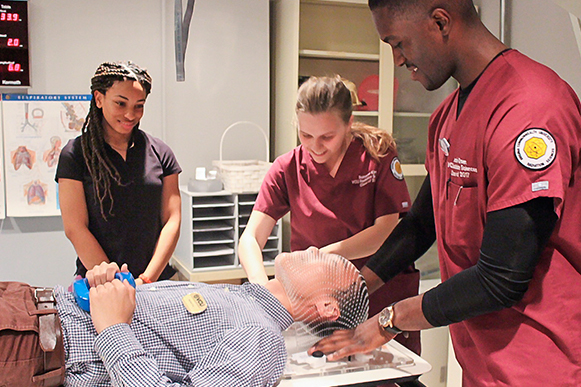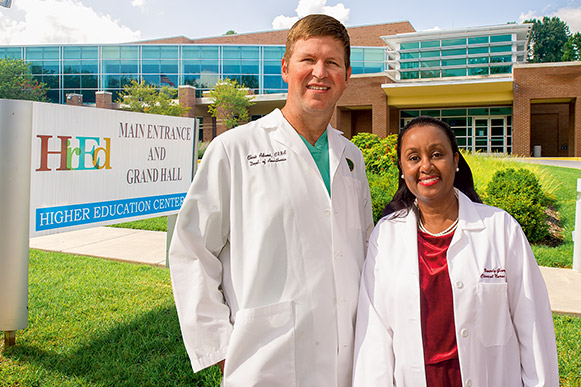Meeting the demand
Skilled, selfless and sought after: VCU College of Health Professions mints students ready to work and give back.
Every day, VCU’s College of Health Professions helps meet the demand created by workforce attrition and the aging population. Our strategy is multifaceted: We’re teaching middle- and high-school students about health careers through the VCU Pipeline, a series of health career exposure and exploration programs. We’re grooming our students for rewarding careers through rigorous classwork, competitive internships and clinical training with our community partners. And, we’re actively recruiting working adults into our distance-learning programs, preparing them to live and work in localities where their skills are needed most.
Once our graduates are in the workforce, they thrive. Many are filling leadership roles. What’s more, you’ll often find our grads going above and beyond their job descriptions through volunteer commitments at home and abroad.
Earlier this year we surveyed our alumni to learn about where you work and how you give back. We were excited to hear from so many of you! You let us know your VCU education has set you up for success, that you value your relationship with the college and that you’re helping countless people every day through all kinds of meaningful pursuits.
The following stories reveal a snapshot of our alumni and provide a glimpse into how the college is actively helping meet today’s — and tomorrow’s — labor needs.

In the pipeline
Unique programs put students on the path to health careers.
Chenel Hodges’ strong desire to help people drew her to the field of health care, where she discovered occupational therapy.
“The summer before my senior year of high school,” she recalls, “I got to see an occupational therapist change a little boy’s life. He went from completely immobile and unresponsive to walking with just the assistance of a walker and responding to certain commands. I saw the OTs bonding with their patients and caring for them in such loving ways, and I wanted to do the exact same thing in the future.”
During her senior year, Hodges learned about VCU Acceleration, one of several programs coordinated by the VCU Division for Health Sciences Diversity focused on increasing awareness of health care careers in individuals from underserved populations. “I knew that entering health care was not going to be easy, and I wanted to all the help I could,” Hodges says. So, she applied.
VCUA is a combination pre-matriculation summer session and academic year-long program for students interested in pre-health concentrations in medicine, dentistry, nursing, pharmacy and other health sciences. The program emphasizes academic preparation in math and hard sciences like biology and chemistry. During the summer session, students get career coaching and assessments. During the academic year, students focus on class rigors and getting acclimated to VCU, then shadow professionals in the field and solidify their academic professional plan.
“Acceleration is an amazing opportunity for students,” says Hodges. “I was able to explore all health care fields and get prepared for my freshman year. Most importantly, Acceleration helped me build an amazing support group to help me get through college and enter into my graduate program.”
Hodges is a textbook example of student benefiting from the VCU Health Sciences Pipeline, which features programs and initiatives intended to support students in their journey toward a health profession. With an array of opportunities from middle school through the post-baccalaureate level, the VCU Pipeline strives to improve the academic and experiential profiles of participants from diverse backgrounds. While each program has its own distinct goals and benefits for students, all of the programs aim to educate and excite students about careers in the health sciences, provide resources to strengthen students’ academic skills in math and science, as well as in verbal and written communication, and ensure students make informed decisions while pursuing the health career of their choice.
VCU Acceleration is one of five pipeline programs that introduce students to skilled health professions and provide VCU’s health sciences schools with bright, dedicated and prepared students from diverse backgrounds. The programs contribute to a larger, more diverse health care work force.
“Students who participate in our programs are retained to the university and graduate on-time at higher rates than the university average,” adds Amy Taloma, assistant director for the Division for Health Sciences Diversity. “They are also more likely to attend VCU health professional programs.”
To learn more, visit the Division for Health Sciences Diversity here.

Filling the gaps
Higher education centers address workforce need.
To help meet the need for a diverse and highly trained workforce, recruiters from the College of Health Professions are targeting communities around VCU’s distance-learning sites in southwest Virginia.
The bachelor’s, master’s and doctoral programs in gerontology, nurse anesthesia and clinical laboratory sciences offered by VCU at the Southwest Virginia Higher Education Center in Abingdon, Va., and the Roanoke Higher Education Center in Roanoke, Va., serve full-time professionals living and working in those rural communities.
Amanda Alley is graduate student services administrator for the Department of Nurse Anesthesia, the No. 1 ranked program in the country by U.S. News & World Report. Alley knows that attracting CRNAs to work in underserved areas such as Abingdon and Roanoke starts with recruiting local candidates into the Certified Registered Nurse Anesthetist (CRNA) and Doctor of Nurse Anesthesia Practice (DNAP) programs offered at Abingdon and the BS-toDNAP program offered at Roanoke.
“Ninety-five percent of our southwest graduates return to the area to work,” she says, “which leads to a higher population of professionals.”
Strong family ties to the area are a driving force. Coupled with a low cost of living and a great salary, the return on students’ investment is significant.
Students in the nurse anesthesia graduate programs must have a registered nursing degree and at least one year of experience working in a critical care setting. Alley’s recruitment efforts include posting fliers in operating rooms and tabling in hospitals where nurse anesthetists are already employed. It’s a strategy that seems to be working: The number of applicants in the Roanoke program doubled from 10 to 20 since 2017. In Abingdon, the number jumped from 15 to 21 in the same time period.
Read more about the College of Health Professions' distance-learning programs here.